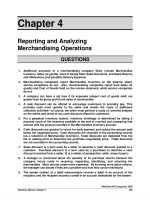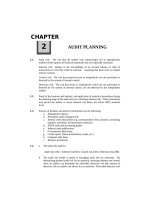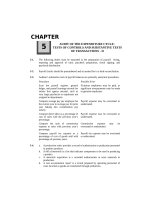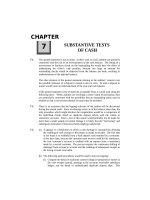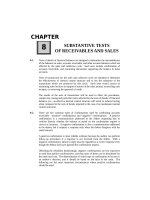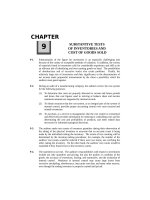Solution with answer applied auditing by cabrera chapter04
Bạn đang xem bản rút gọn của tài liệu. Xem và tải ngay bản đầy đủ của tài liệu tại đây (110.73 KB, 7 trang )
CHAPTER
4
AUDIT OF THE EXPENDITURE CYCLE:
TESTS OF CONTROLS AND SUBSTANTIVE TESTS
OF TRANSACTIONS - I
4-1.
Transactions in the expenditure cycle are recorded in the purchases and cash
payments journal or in the voucher register and the check register. Relevant
accounts are cash; vouchers payable; inventory, property, plant and equipment;
purchases; purchase returns and allowances; purchase discounts; prepaid rent and
other prepaid accounts; and expense accounts.
4-2.
Errors that occur in the expenditure cycle include recording purchases in the
wrong period (cutoff errors), recording goods held on consignment as a purchase,
misclassifying purchases, failing to record payments, recording payments twice,
and failing to recognize prepaid expenses. Irregularities often relate to purchases
and include paying for fictitious purchases, purchasing goods for personal use,
and obtaining kickbacks.
4-3.
Audit objectives for acquisitions transactions are to verify the following
assertions:
4-4.
Existence or occurrence: Recorded acquisitions are for items that were
acquired.
Completeness: Acquisitions that occurred are recorded.
Rights and obligations: Recorded acquisitions are the entity’s purchases and
liabilities.
Valuation or allocation: Acquisitions are recorded for the proper amounts.
Presentation and disclosure: Acquisitions are recorded to result in
presentation and disclosure in accordance with GAAP.
The following misstatements could arise if controls for payments are ineffective:
Existence or occurrence
Unauthorized or inappropriate payments may be made.
Completeness
Checks may be issued and not recorded.
Rights and obligations
Unauthorized payments may be made.
4-2
Solutions Manual to Accompany Applied Auditing, 2006 Edition
Valuation or allocation
Improper amounts may be paid because of math errors or incorrect discount.
Account may not reconcile or discrepancy may not be disclosed.
Presentation and disclosure
Payments may be credited to wrong accounts.
4-5.
A vendor’s invoice is a bill for a single purchase, whereas the vendor’s monthly
statements report the beginning balance, additional sales, any payments, and the
ending balance. Auditors reconcile the monthly statements to the details included
in the vouchers payable listing to ascertain that all vouchers payable are recorded.
Vendors’ statements are generally considered to be a strong form of evidence
about amounts owed to particular vendors.
4-6.
1) a
2) b
3) c
4-7.
1) b
2) c
3) c
4-8.
1) d
2) a
3) a
4) d
5) b
6) a
4-9.
1) b
2) b
3) c
4-10.
1) d
2) a
4-11.
1.
a.
7) c
b.
c.
A purchase requisition, purchase order, receiving report, and vendor’s
invoice should be compared and filed in support of each acquisition.
Examine file of documents.
Existence
2.
a.
b.
c.
Receiving reports should be prenumbered and accounted for.
Examine file of documents.
Existence
3.
a.
A purchase requisition, purchase order, receiving report, and vendor’s
invoice should be compared and filed in support of each acquisition.
Examine file of documents.
Existence
b.
c.
4.
a.
b.
c.
Invoice amounts should be verified by reference to purchase orders, and
mathematics of invoice should be rechecked.
Examine vouchers for signature indicating performance.
Valuation
Audit of the Expenditure Cycle: Tests of Controls and Substantive Tests of Transactions – I
5.
a.
c.
Chart of accounts should adequately describe accounts to be debited.
Account coding should be assigned by one person and checked by
another.
Examine chart of accounts. Examine signature of employee performing
check.
Presentation and disclosure
a.
b.
c.
Vouchers should be prenumbered and accounted for.
Observe procedure. Account for a numerical sequence.
Completeness
b.
6.
4-12.
1) a
4-13.
Fresh Foods Grocery Store
1.
2.
3.
4.
4-3
2) b
a.
1) Adequate documents and records.
2) Independent checks on performance.
b.
Transactions are properly valued.
c.
1) Make sure the billing clerk receives the current price list.
2) Internal verification by someone who has the current price list.
a.
Adequate documents and records.
b.
Recorded transactions are valid.
c.
1) Require that payments only be made on original invoices.
2) Require a receiving report be attached to vendor’s invoice before a
payment is made.
a.
1) Adequate documents and records.
2) Physical control over assets.
3) Independent checks on performance.
b.
Recorded transactions are valid.
c.
1) Fence in the physical facilities and prohibit employees from parking
inside the fencing.
2) Require the accounting department to maintain perpetual inventory
records and take physical counts of actual sides of beef periodically.
a.
Independent checks on performance.
b.
Transactions are properly valued.
c.
Counts by qualified personnel and independent checks on performance.
4-4
Solutions Manual to Accompany Applied Auditing, 2006 Edition
5.
6.
4-14.
a.
Proper procedures for authorization.
b.
1) Transactions are properly valued.
2) Transactions are properly authorized.
c.
1) Make sure the salesman has a current price list.
2) Require independent approval of all transactions including the price
before shipment is made.
a.
1) Adequate documents and records.
2) Independent checks on performance.
b.
Transactions are recorded at their proper time.
c.
Carefully coordinate the physical count of inventory on the last day of
the year with the recording of sales to make certain counted inventory
has not been billed and billed inventory has not been counted.
Love Company
a. Function
b. Error or Irregularity
c. Compliance Test(s)
1.
Ordering items
requested
Purchases may be for
unauthorized purposes or
items.
Review evidence of
matching of purchase
orders with receiving
reports and vendors’
invoices.
2.
Receiving items
ordered
Goods received may not be
accounted for.
Review evidence of
numerical sequencing of
receiving reports.
3.
Receiving items
ordered
Goods delivered to
requisitioner may not agree
with goods shown on
receiving report.
Review receiving report for
signature of requisitioner.
4.
Preparing the
voucher
Vouchers may be prepared
for goods that were not
ordered or received.
Review evidence of
matching by voucher clerk.
5.
Paying the liability
Checks may be issued
without proper
authorization.
Examine supporting
documentation for each
check.
6.
Paying the liability
An approved voucher may
be paid more than once.
Examine mutilation of paid
vouchers.
7.
Paying the liability
Checks may not agree with
amount or payee on
voucher.
Examine voucher for
evidence of performance by
check signers.
Audit of the Expenditure Cycle: Tests of Controls and Substantive Tests of Transactions – I
4-15.
4-5
8.
Preparing the
voucher
Vouchers may be incorrect
as to payee and amount.
Examine evidence of
verification.
9.
Protecting inventory
Inventory may be stolen.
Observe storage security.
10. Updating inventory
records
A purchase may not be
posted to inventory records.
Review evidence of
reconciliation.
11. Journalizing and
posting cash
disbursements
A check may not be
recorded.
Review evidence of
verification.
12. Maintaining
correctness of cash in
bank
A mathematical error may
be made in computing the
bank balance.
Review evidence of
reconciliation.
13. Paying the liability
Checks may be diverted to
unauthorized payees.
Review checks for names of
payees.
14. Ordering
Purchases may be for
unauthorized purposes.
Examine purchase order for
supporting documentation.
15. Requisitioning
Excess quantities of goods
may be ordered.
Examine evidence of
supervisor approval.
Maybelle Corporation
a.
Those internal accounting control procedures that Long would expect to find if
Maybelle’s system of internal control over purchases is effective are as follows:
Purchase requisitions are prepared and/or approved only after there has been
a proper determination of the need for the goods requested.
One copy of the purchase requisition is maintained on file in the stores
department.
Purchase requisitions are approved by a responsible person in the stores
department. Approval is given only after that person is satisfied that a need
exists and that the requisition is properly prepared. Approval is clearly
indicated on requisitions.
Purchase orders are issued only after they are approved by persons given the
specific responsibility to make such approval.
Vendors are requested to confirm purchase orders. This indicates acceptance
and constitutes a contractual commitment.
Purchase requisitions are filed with purchase orders, and both are maintained
in an orderly file in the purchase office.
Copies of purchase orders sent to the receiving department do not include
the quantities of merchandise ordered.
All purchase orders are numbered, and all numbers are accounted for. This
allows control over purchase orders canceled or rejected by vendors.
4-6
Solutions Manual to Accompany Applied Auditing, 2006 Edition
Receiving department accepts only those goods for which a purchase order
is on hand.
b. (1) The question of when to order depends primarily on quantities on hand,
rate of use, and the lead time between order placement and receipt of
goods. Other factors include the trade-off between the cost of owning and
storing merchandise versus the risk of being out of stock.
(2) Factors considered in determining how much to order include expected
use, costs of placing an order, receiving and paying for what has been
purchased, set-up costs, storage costs, interest on investment, risk of
obsolescence or deterioration, quantity discounts, and shipping costs. The
determination is made judgmentally or mathematically by arriving at an
economic order quantity.
4-16.
1.
a.
b.
c.
d.
Rights and obligations
Unauthorized payments may be made.
Inquire and observe separation.
Examine vouchers and bank reconciliations.
2.
a.
b.
c.
d.
Existence of liability
Documents may be reused and acquisitions may be recorded twice.
Examine cancellations on documents.
Scan voucher register for duplicate payments.
3.
a.
b.
c.
Existence or occurrence
Unauthorized payments may be made or checks may never be mailed.
Inquire and observe that authorized individual signs and promptly mails
checks.
Examine paid checks for appropriate signature.
d.
4.
a.
b.
c.
d.
5.
6.
a.
b.
c.
Valuation
Improper amounts may be paid because of math errors or incorrect
discounts.
Examine signature on invoice indicating calculation has been verified.
Recalculate paid invoices.
d.
Existence or occurrence
Acquisitions that did not occur may be recorded.
For a sample of cash payments, examine a purchase requisition, purchase
order, receiving report, and vendor’s invoice filed in support of each
acquisition.
Scan voucher register for large or unusual items.
a.
b.
c.
d.
Completeness
Acquisitions or payments may not be recorded.
Examine reconciliations.
Perform reconciliations.
Audit of the Expenditure Cycle: Tests of Controls and Substantive Tests of Transactions – I
4-17.
4-7
a.
For the four conditions, the following risks are incurred:
1. Buyers would not be officially notified of the strict code of conduct to
which management expects them to adhere. Buyers could deny that they
were expected to conform to a prescribed code of conduct.
2. Only favored suppliers may be asked to bid. Low-cost supplier may be
excluded.
3. Bids from favored suppliers could be retained. Bids from nonfavored
suppliers could be discarded.
4. The defect was caused by a minor human error. The procedure seems to
be adequate and requires no improvement.
b.
For the four conditions, the following controls are recommended:
1. Require buying personnel to periodically report all outside business
affiliations or employment. Issue a formal statement of policy on
conflicts of interest. Require buying personnel to report the receipt of
gifts and other personal benefits from suppliers.
2. Require personnel at appropriate levels of supervision in the purchasing
department to review and approve the list of bidders. Require buyers to
use a list of acceptable suppliers.
3. Require receipt and retention of bids until the bid-closing date, either by
an independent service or by the purchasing agents’ or purchasing
managers’ administrative assistant.
4. Verbally recommend that the responsible buyer should be instructed on
the requirements for authorized requisitions.

